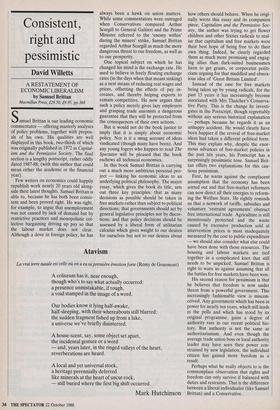Consistent, right and pessimistic
David Willetts
A RESTATEMENT OF ECONOMIC LIBERALISM by Samuel Brittan Macmillan Press, £29.50, £9.95, pp.368 Samuel Brittan is our leading economic commentator — offering masterly analyses of policy problems, together with propos- als of his own. His qualities are well displayed in this book, two-thirds of which was originally published in 1972 as Capital- ism and the Permissive Society. The final section is a lengthy postscript, rather oddly dated 1987-88; (with this author that could mean either the academic or the financial year).
Few writers on economics could happily republish work nearly 20 years old along- side their latest thoughts. Samuel Brittan is able to, because he has both been consis- tent and been proved right. He was right, for example, to argue that unemployment was not caused by lack of demand but by restrictive practices and monopolistic col- lective bargaining driving up pay so that the labour market does not clear. Although a dove in foreign policy, he has always been a hawk on union matters. While some commentators were outraged when Conservatives compared Arthur Scargill to General Galtieri and the Prime Minister referred to the 'enemy within' during the miners' strike, Samuel Brittan regarded Arthur Scargill as much the more dangerous threat to our freedom, as well as to our prosperity.
One topical subject on which he has changed his mind is the exchange rate. He used to believe in freely floating exchange rates (in the days when that meant sinking) as a neat means of reducing real wages and prices, offsetting the effects of pay in- creases, and thereby helping exports to remain competitive. He now argues that such a policy merely gives lazy employers and grasping trade unionists a dangerous guarantee that they will be protected from the consequences of their own actions.
But it would not do the book justice to imply that it is simply about economic policy. Nor is it a smug account of ideas vindicated (though many have been). And any young fogeys who happen to read The Spectator will be pleased that the book eschews all technical economics.
In this book Samuel Brittan is carrying out a much more ambitious personal pro- ject — linking his economic ideas to an underlying political philosophy. The major essay, which gives the book its title, sets out three key principles: that as many decisions as possible should be taken in free markets rather than subject to political directions; that governments should act by general legislative principles not by discre- tions; and that policy decisions should be assessed by a liberal form of utilitarian calculus which gives weight to our desires for ourselves but not to our desires about how others should behave. When he origi- nally wrote this essay and its companion piece, Capitalism and the Permissive Soc- iety, the author was trying to get flower children and other Sixties radicals to real- ise that capitalism and free markets were their best hope of being free to do their own thing. Indeed, he clearly regarded them as much more promising and engag- ing allies than dark-suited businessmen keen to get grants, or corporatist politi- cians arguing for that muddled and obnox- ious idea of 'Great Britain Limited'.
Instead of the case for free markets being taken up by young radicals, for the past 15 years it has increasingly become associated with Mrs Thatcher's Conserva- tive Party. This is the change he investi- gates in the Postscript, though regrettably without any serious historical explanation — perhaps because he regards it as an unhappy accident. He would clearly have been happier if the revival of free-market ideas had taken a different political form. This may explain why, despite the enor- mous advances of free-market policies in the past ten years, his Postscript has a surprisingly pessimistic tone. Samuel Brit- tan offers two explanations for this cau- tious pessimism.
First, he warns against the complacent assumption that the economy has been sorted out and that free-market reformers can now direct all their energies to reform- ing the Welfare State. He rightly reminds us that a network of tariffs, subsidies and voluntary 'restraint agreements' obstruct free international trade. Agriculture is still monstrously protected and the waste caused by excessive production sold at intervention prices is most inadequately measured by the cost to public expenditure — we should also consider what else could have been done with those resources. The housing and labour markets are tied together in a complicated knot that still needs to be unpicked. Samuel Brittan is right to warn us against assuming that all the battles for free markets have been won.
His second reason for pessimism is that he believes that freedom is now under threat from a powerful government. This increasingly fashionable view is miscon- ceived. Any government which has been in power for nearly ten years, which still leads in the polls and which has stood by its original programme, gains a degree of authority rare in our recent political his- tory. But authority is not the same as authoritarianism. And even though the average trade union boss or local authority leader may have seen their power con- strained by new legislation, the individual citizen has gained more freedom as a result.
Perhaps what he really objects to is the commonplace observation that rights and freedom can only survive if balanced with duties and restraints. That is the difference between a liberal individualist (like Samuel Brittan) and a Conservative.


































































 Previous page
Previous page